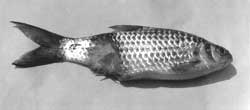Poisonous deeds
Poisonous deeds

in the hill streams of Wynad and Malappuram districts in the Western Ghats, aquatic biodiversity gets a raw deal as crude methods are used to trap them. Particularly offensive is the use of copper sulphate (cuso4-locally known as 'thurrussu'). People residing near the Chaliyar river have perfected the technique of fishing by using cuso4 by wrapping it in cloth and tying it to a long pole or stick. The pole or stick is driven into the crevices of the rocks and stones. Due to the irritation caused by the dissolved cuso4, the fish rush out of the crevices to get entangled in the gillnets spread around the rocks. In one haul, 10-15 kg of fish are caught.The cuso4 crystals also kill the eggs, larvae and the algae found in the habitat.
cuso4 is a commonly used pesticide. A market survey indicated that about 10 tonnes (t) of the chemical is sold annually in the small town of Nilambur in Malappuram district. The total sales of the chemical in the district may be more than 50 t annually, out of which at least five t could be annually used for fishing. The chemical consists of copper ions and sulphate ions. The copper in the ionic form gets ingested in the body of fish and other animals and can accumulate in their kidneys and liver. Recently, large-scale mortality of fish was observed in many of the streams of the Western Ghats and in the Chaliyar river. The diseased fish also had large ulcers on their bodies.
The Conservation of Nature Trust, Calicut, has written to the Kerala government to regulate and restrict the sales of cuso4. It quoted the high incidence of kidney problems among people also, probably due to the contamination of drinking water as a result of using cuso4. Though under Section 5(1) of the Indian Fishery Act, 1897, using any poison, lime or noxious materials in water with the intent to catch or destroy any fish shall be punishable with imprisonment for a term of two months, the practice of using cuso4, continues without a check.







